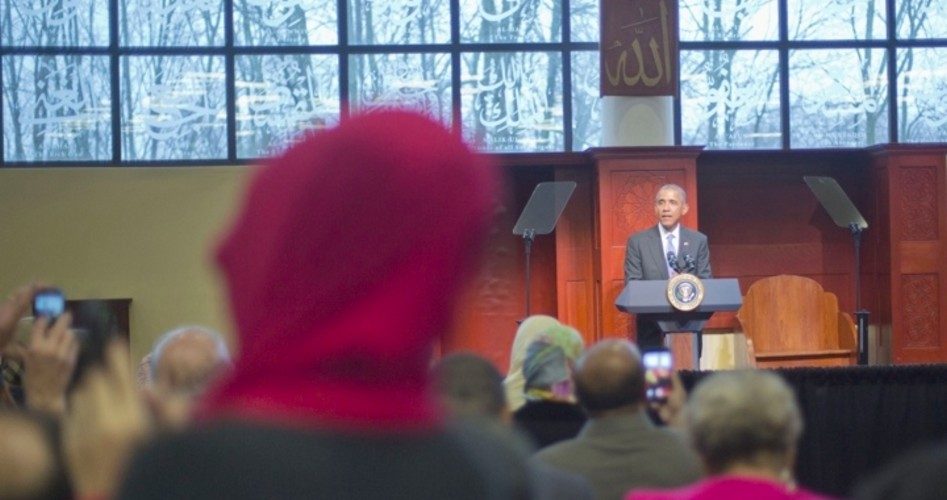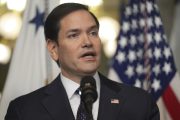
On February 3, President Obama made his first visit to an American mosque in his seven years in office. The locale, the Islamic Society of Baltimore (ISB), gave the president an enthusiastic reception, and the usual platitudes about non-discrimination and breaking down religious barriers followed. “I want to say two words Muslim Americans don’t hear often enough: Thank you,” the president told his audience. “We are one American family.”
He continued:
I want you to know that from the president to the FBI director to everybody in law enforcement, my directive, and their understanding, is that this is something we have to do together. Engagement with Muslim-American communities must never be a cover for surveillance. We can’t give in to profiling entire groups of people. There’s no one single profile of terrorists.
Fine words, except that it turns out that the FBI has kept the Islamic Society of Baltimore under surveillance since 2010. That was the year one of its members was arrested for planning to bomb an Army recruitment center in nearby Catonsville, Maryland.
The would-be terrorist, a Hispanic convert to Islam named Antonio Martinez — who had taken the Islamic name Muhammad Hussain — tried to recruit other members of the mosque, telling them of other contacts who had the know-how to make explosives. Martinez also expressed a desire to become a mujahideen fighter in Afghanistan — or even in Pakistan, where most of the ISB’s leadership hails from.
The FBI was notified, but when they tried to place an agent inside the mosque to keep tabs on Martinez, the mosque leadership protested, concerned at being under government surveillance.
“If I was the president of the mosque, I would not let you come here without strip(-searching) you,” one mosque member told the FBI indignantly, “because you might drop something (like a bug) to hear what’s going on here.”
Such reactions are hardly surprising, given ISB’s pedigree. The mosque is affiliated with the Islamic Society of North America (ISNA), which was named in 2007 by federal prosecutors as a front for both Hamas and the Muslim Brotherhood, and was implicated in a plan to send $12 million in support of Hamas suicide bombers. Leaving no doubt as to its sympathies, ISB has helped the ISNA to organize conferences.
For 15 years, ISB was led by Mohammad Adam el-Sheikh, a radical imam with ties to an al-Qaeda front group, and who publicly expressed sympathies for the practice of suicide bombing.
Giving President Obama the benefit of the doubt, it would appear that ISB, his venue for making a statement on behalf of solidarity with America’s Muslims, was a less-than-judicious choice. On the other hand, he reportedly let the Council on American-Islamic Relations (CAIR) vet and pick the venue for him — despite the fact that CAIR has been prohibited by the FBI from outreach because of its ties with Hamas, a Palestinian terrorist organization.
The president’s message on Islam and on American Muslims continues to be a mixed one, precisely because the president insists, correctly enough, that most Muslims are neither terrorists nor radical sympathizers — while ignoring the reality of Islamic extremism and terrorism in our midst, and even, however unintentionally, giving such activities the color of legitimacy by ill-advised PR stunts like his visit to the Baltimore mosque.
If President Obama is sincere about deflecting criticism and allaying suspicions as to his alleged excess of sympathy for Islam, he would do well to avoid association with that portion of Islam plugged into the international Islamic terrorist network — a coalition of extremists responsible not only for ongoing terror campaigns across the world, but also, as quasi-state actors in the Islamic world, for horrific brutality against other Muslims, as we have seen with the Taliban in Afghanistan and Pakistan, as well as with ISIS in the Middle East.
Photo of President Obama speaking at the Islamic Society of Baltimore: AP Images


